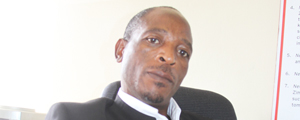
Defence minister Emmerson Mnangagwa’s recent utterances on the issue of soldiers and their freedom to support political parties are as cunning as they could be dangerous.
LandScape with Tangai Chipangura
Mnangagwa, a lawyer by profession, made his statements sound as innocent and harmless as he appears when in his newfound “born-again” Christian sermons he preaches peace, love and harmony at political rallies.
But anyone who has followed Zimbabwean politics and the involvement and flagrant and deadly interference of the army in the country’s politics can easily see the “Crocodile” (Ngwena), as Mnangagwa is known in political circles, is showing his true colours — baring his jaws as it were.
No one has complained about soldiers voting in elections — except, of course, when they are made to cast their ballot in front of their commanders who would make sure they voted “correctly”. The issue that Zimbabweans have raised has virtually nothing to do with the political affiliation of foot soldiers.
After all, election results in areas covering army barracks have often shown that many soldiers and their families have not voted for the establishment.
What has worried the people of Zimbabwe are declarations by army commanders that they would refuse to take orders from certain parties or people in the event they took over power from their party, Zanu PF. Concerns were that, such declarations bordered on treason and tended to have a threatening effect on the men and women they command in the army.
No one would lose sleep if one army commander were to cast his vote for a political party of his choice, but it is a different story if a military commander openly told his charges that the army would refuse to take orders from a political contestant that was not a leader of a certain political party.
- Chamisa under fire over US$120K donation
- Mavhunga puts DeMbare into Chibuku quarterfinals
- Pension funds bet on Cabora Bassa oilfields
- Councils defy govt fire tender directive
Keep Reading
Mnangagwa said: “We went to war for us to have power to control the direction of politics in this country. Soldiers are free to vote for any political party and what they are not allowed to do is to hold positions in political parties.”
Statements such as this would seem to exonerate army commanders’ declaration of their political affiliation, but it cannot certainly make right their threats to the people’s choice of leadership. Which is why Sadc, the guarantor of the Global Political Agreement (GPA), has said it was closely monitoring the military’s behaviour and also reminded securocrats to remain professional and not meddle in politics.
This telling Sadc message was delivered on the sidelines of the South Africa-Zimbabwe 7th Joint Permanent Commission on Defence and Security held at Mount Nelson Hotel in Cape Town from November 21-23 last year.
Mnangagwa was part of the delegation that was led by State Security minister Sydney Sekeramayi and included the Director-General of the Central Intelligence Organisation, Happyton Bonyongwe, and top military officers.
The South Africans are wary of statements made by senior military officers last year, among them Major-Generals Douglas Nyikayaramba, Trust Mugoba and Martin Chedondo, who openly declared their loyalty to Zanu PF and said they would not salute Morgan Tsvangirai, who is the most likely person to beat Zanu PF to the Presidency of Zimbabwe.
Military chiefs whom Mnangagwa claims their public support of Zanu PF is harmless are believed to have taken a “hands-on approach” in the country’s politics and came to the aid of President Robert Mugabe after he lost the first round of the presidential poll to Tsvangirai in March 2008.
Instead of, as Mnangagwa says they would, accepting the outcome that would have kicked their party out of power, the securocrats embarked on a bloody campaign that left hundreds dead or maimed and many thousands displaced, resulting in Tsvangirai pulling out of the June 27 run-off fearing more deaths of his supporters.
Statements by generals and the involvement of the military in Zanu PF activities have given credence to fears that the security forces may once again play a major role in the upcoming elections.
The top military brass, which has accumulated great wealth, is keen to keep Mugabe in power and has been involved in the Zanu PF restructuring exercise around the country. There are also reports of the military already campaigning for Zanu PF in several provinces.
Concerns over the army’s involvement in national politics have seen MDC leader, Professor Welshman Ncube, going as far as suggesting Zimbabwe’s security top brass must retire en masse to avoid bloodshed or instability should Mugabe lose the next election. Ncube was reported in the media as saying securiocrats’ partisanship and long history of involvement in the country’s politics could scuttle a smooth transfer of power.There is no doubt, and Mnangagwa knows it, that Zimbabwe’s military brass is fiercely loyal to the governing Zanu PF party and Mugabe.
That is why they have so brazenly spoken their minds, telling the world that they would not allow Tsvangirai or anyone that was not Mugabe or his appointee to rule this country.
Those are the issues that trouble Zimbabweans, Cde Mnangagwa. Not the individual decision by individual soldiers to support political parties of their choice. There has never been any fear that given the freedom of choice, Zimbabwean soldiers would all support any one single party!
Feedback: [email protected]











